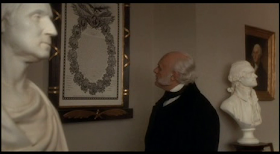If you saw Amistad, you remember that the story begins with a mutiny on a slave ship whose name literally means "friendship". That hardly describes the horrors for the captives aboard the boat as it crossed the ocean. This story happened in 1839 when slavery was already a divisive issue in our new country. My mind's eye remembers the African Cinque standing at his trial and extending his wrist irons as he fiercely pleads "give us free!".
After Roger Baldwin represented the Africans successfully in two trials, the case went to the Supreme Court and was argued by John Quincy Adams, our former President. Mike remembered that it was his father, John Adams, who took the case of the British soldiers who fired into the crowd at the Boston Massacre in 1770. The Adams' men were lawyers of conviction.
Mike and I were surprised to recognize the courtroom in the movie. Earlier last night, FOX News had covered the freshman class of the House being sworn in. And in that coverage they showed different parts of the Capitol, including the first floor (which was the original Capitol until the present Capitol was built above it). Bret Baier had the camera pan around the room as he explained that years ago, the Supreme Court met there. And that was the setting for the Supreme Court scene in Amistad.
Anthony Hopkins' presentation to the high court on behalf of Cinque was magnificent http://www.historycentral.com/amistad/amistad.html. It called his audience of judges (five of which were Southerners) to consider the power and privilege of freedom. And as he recounted the African's spiritist dependance on ancestors for courage, John Quincy Adams (our 6th President) walked by the marble busts of George Washington and Thomas Jefferson and his own father John Adams (our 2nd President)...and considered the wisdom of those founders. In the picture below, John Quincy Adams (Hopkins) is reading the Declaration of Independence and quoting the phrase "all men are created equal".
It took courage from both of these lawyers to defend a very unpopular cause upon which many livelihoods hinged. Roger Baldwin (McConaughey) suffered death threats. He was a man with impressive credentials...his father was a lawyer/Congressman and his mother was the daughter of one of the signers of the Declaration. But Roger Baldwin's legacy is his fight against slavery and his defense of the less fortunate. He went on after the Amistad case to become Governor of Connecticut and also a U.S. Senator. John Quincy Adams was ridiculed and lampooned as a old man who snoozed through sessions of Congress (after President Adams left office, he was elected to Congress...only one of two presidents to do such a thing). And in fact, he WAS toward the end of his life. He died only seven years after winning the Amistad case. Our country owes a deep debt of gratitude to John Quincy Adams. He never took one dime for his work on the Amistad case. But I was thrilled to read this huge piece of gratitude that went to JQA in the form of a Mendi Bible, presented to him with a letter which read:
"We are about to go home to Africa. We go to Sierra Leone first, and then we reach Mendi very quick. When we get to Mendi we will tell the people of your great kindness. Good missionary will go with us. We shall take the Bible with us. It has been a precious book in prison, and we love to read it now we are free! Mr. Adams, we want to make you a present of a beautiful Bible! Will you please to accept it, and when you look at it or read it, remember your poor and grateful clients?... For the Mendi people. CINQUE, KINNA, KALE. Boston, Nov. 6, 1841"
Today his Mendi Bible and the letter can be seen at the Adams National Historic Park in Quincy, MA. In response to their gift, Mr. Adams wrote..."it was from that book that I learnt to espouse your cause when you were in trouble."
I have been thinking a lot about our times and their times. Things change, but things stay the same. Our country's course was steered by men who held fast to God and wrote the Declaration of Independence. Here we are 169 years later and the issue before the American people is whether to trust the founders' wisdom that has served our country well, or regard their words as dusty and inapplicable.
The Amistad case went to the Supreme Court because President Van Buren was concerned about his own re-election and so injected himself into the contest. JQA rightly pointed out to the Supremes the division between the executive and judicial branches of our government. Today things are whomper-jawed again. The executive branch overreaches...the judicial branch overrules the will of the people...and the legislative branch abdicates their contribution. We flatter ourselves if we think we have outgrown our founding documents. The delicate balance of power that they carefully laid out is the fertile ground of liberty.
"If the Son shall make you free, you shall be free indeed." John 8.36


No comments:
Post a Comment